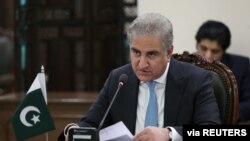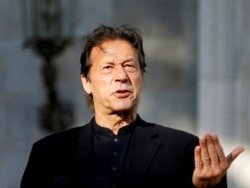Pakistan has formally conveyed to the United States that Islamabad will not provide military bases to Washington for counterterrorism operations in Afghanistan after all international troops exit the war-torn country, and the U.S. side has stopped raising the issue, senior Pakistani officials said.
Several top Pakistani government officials, privy to a flurry of recent high-level bilateral talks, shared some details Tuesday of the discussions with VOA on condition of anonymity because they are not authorized to publicly engage with media.
“Yes, they [U.S. officials] have had conversations and we have told them we don’t want any terrorism whatsoever, but no bases possible. They have stopped raising bases issue with us,” said a Pakistani official, who deals with national security matters.
Since U.S. President Joe Biden announced in mid-April that all American troops will be out of Afghanistan by September 11, his national security team has been reaching out to regional allies to arrange for military facilities needed to gather intelligence and carry out counterterrorism strikes if the turmoil-hit nation descends into another round of civil war after U.S. and NATO troops pull out.
U.S. Central Intelligence Agency Director William Burns made a previously unannounced visit to Pakistan in late April, where he is said to have spent an entire day meeting with his Pakistani counterpart and the country’s military chief, General Qamar Javed, Pakistani officials confirmed Tuesday to VOA.
A security official with knowledge of the visit said that in meetings with the CIA chief, there was “no mention at all” of hosting American bases in Pakistan, “because it is next to impossible for us.”
The official said both sides discussed counterterrorism cooperation, however, and the Americans sought “our help, but we told them Pakistan would like to fight terrorism “in its own way.”
U.S. Defense Secretary Lloyd Austin and Secretary of State Antony Blinken also repeatedly have spoken to Bajwa by phone, while National Security Adviser Jake Sullivan held a meeting late last month in Geneva with his Pakistani counterpart, Moeed Yusuf.
Negotiating regional help
Both sides have released few details of their high-level interactions, raising speculation about the nature of the talks and the fate of future bilateral ties. Some media reports have even asserted that Washington and Islamabad were on the verge of reaching a deal on military bases-related cooperation.
During Monday’s White House press briefing, VOA asked Sullivan about the engagements with Pakistan, but he declined to get into the details of the negotiations.
“We have had constructive discussions in the military, intelligence, and diplomatic channels with Pakistan about the future of America's capabilities to ensure that Afghanistan never again becomes a base from which al-Qaida or ISIS, or any other terrorist group can attack the United States,” said Sullivan, using an acronym for the Islamic State terror group.
The U.S, national security adviser stressed, though, that Pakistan was not the only country the Biden administration was engaging with on the subject.
“What I will say is that we are talking to a wide range of countries about how to build effective over-the-horizon capacity, both from an intelligence and from a defense perspective to be able to suppress the terrorism threat in Afghanistan on a going-forward basis,” Sullivan said in response to VOA’s query.
U.S. officials also have discussed having bases in one of the Central Asian countries bordering Afghanistan, but Russia already has voiced opposition, saying those nations have assured Moscow they have no plans to allow such activities from their soil.
Fate of US-Pakistan ties
Officials in Islamabad dismiss suggestions their traditionally uneasy relationship with Washington could face another round of tensions over the issue of military bases.
“We believe in furthering our bilateral relationship based on mutual trust and understanding,” Pakistani Foreign Ministry spokesman Zahid Hafeez Chaudhri told VOA, when asked about the ongoing dialogue with Washington.
He said the Pakistani and the U.S. national security advisers in their Geneva meeting reiterated the need to further bilateral cooperation between the two countries.
“This cooperation is rooted in shared values and convergence of interest on regional and strategic issues including on the Afghan peace process and post-withdrawal development in Afghanistan,” said Chaudhri.
Pakistani Prime Minister Imran Khan, who took office some three years ago, has maintained his government will not become part of any future U.S. war but would rather assist in finding a negotiated settlement to the Afghan conflict.
While in opposition, Khan was among a few Pakistani politicians who vehemently opposed and even led protest rallies against the U.S.-led military invasion of Afghanistan 20 years ago. Pakistani Foreign Minister Shah Mehmood Qureshi last month issued a policy statement in the parliament, refuting reports of another bilateral military arrangement with the United States.
“Let this house and the Pakistani nation be a witness to my testimony that with [Prime Minister] Imran Khan around there will be no American base built on Pakistani soil. Forget about the past,” Qureshi said. “The government of Pakistan has categorically said that we will not allow kinetic use of drones, nor are we interested in the surveillance of your drones.”
The United States has for years used Pakistani ground routes and air space to ferry supplies to U.S. and NATO troops in Afghanistan. The fate of what are known as GLOCS and ALOCS (ground lines of communications and air lines of communications) also is unclear once foreign troops withdraw from the region.
“There is a demand building within Pakistan that we should now discontinue the GLOCS and ALOCS because once the troop withdrawal is complete, this facility will become redundant,” said a close political aide to the prime minister.
Pakistan-China ties
Separately, China has cemented its ties with close ally Pakistan in recent years, investing billions of dollars in building roads, ports and power plants as part of its global Belt and Road Initiative. Beijing also has provided substantial financial relief to Pakistan to help the country overcome its balance-of-payment crisis.
Allowing any U.S. combat activity from Pakistani soil would be “detrimental” to Islamabad’s relations with Beijing, said Khan’s aide.
“We have very close relations with China, and we would definitely not like to antagonize them, and Pakistan cannot afford that,” the aide told VOA on condition of anonymity.
Prime Minister Khan repeatedly has stated Pakistan’s economic future is “now connected to China.” That does not mean Islamabad is saying goodbye to any country, however, and nor do they want that, his aides say.
One Pakistani official insisted they are looking for “enhanced business and trade” partnership with U.S. counterparts.
“We are engaging with them on the basis of what do we want of each other rather than discussing or digging into the past. We are not going to accept financial assistance with strings,” the official asserted.
White House Bureau Chief Steve Herman contributed to this report.






